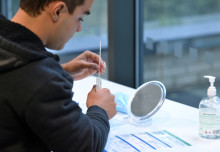

The first patient to receive gene therapy for an incurable type of blindness has been treated as part of a trial involving Imperial College London.
Adapted from a news release issued by Oxford University and Oxford Radcliffe Hospitals. Photo courtesy of BBC News.
Thursday 27 October 2011
The first patient to receive gene therapy for an incurable type of blindness has been treated as part of a trial led by Oxford University in collaboration with Imperial College London.
See also:
Related news stories:
If successful, the advance could lead to the first-ever treatment for choroideraemia, a progressive form of genetic blindness that first arises in childhood and is estimated to affect over 100,000 people worldwide.
"This disease has been recognised as an incurable form of blindness since it was first described over a hundred years ago," said Professor Robert MacLaren of the University of Oxford, who is leading the trial. "I cannot describe the excitement in thinking that we have designed a genetic treatment that could potentially stop it in its tracks with one single injection."
The novel gene treatment was developed by Professor MacLaren at Oxford University in collaboration with Professor Miguel Seabra at the National Heart and Lung Institute at Imperial. It is designed to provide the gene missing in people with choroideraemia to stop the deterioration that gradually leads to blindness.
It uses a virus essentially as a delivery vehicle that ferries DNA including the missing gene into the right part of the eye. The virus has been engineered to infect the light-sensitive cells in the retina known as photoreceptors. There the gene is switched on and becomes active.
With this particular gene therapy, the treatment could provide a one-off permanent correction of the disease because the gene is thought to remain in the retinal cells indefinitely.
“The ability to offer a gene replacement treatment for these patients was the final objective of 20 years of intense research in my laboratory,” Professor Seabra said. “In the process, I have witnessed the power of individuals to influence events. Reaching this stage was only possible because a handful of affected families and private charities raised enough funds to allow us to perform the relevant research. This is a moment of fulfilment for us and a dream come true for all choroideraemia patients”.
Choroideraemia is a genetic disease that leads to progressive degeneration of the retina in the eye. It generally affects males only and there is no treatment. The diagnosis is usually made in childhood and leads to blindness in men by their forties. It occurs due to deficiency of the REP1 gene located on the X chromosome.
The trial will see 12 patients undergo surgery in which the gene therapy is injected into one eye. The other eye would then act as a control against which to assess any treatment effect. The researchers would however aim to go on to treat the second eye, should the treatment be proven to be effective.
This is a moment of fulfilment for us and a dream come true for all choroideraemia patients.
– Professor Miguel Seabra
The aim of the trial is primarily to assess safety, but it will also gain initial data on how effective the treatment is. The researchers estimate that it will take two years to know whether or not the degeneration has been stopped completely by the gene therapy.
Much of the preclinical work leading up to the trial has been led by Professor Seabra and Dr Tanya Tolmachova at Imperial. Professor Seabra played a key role in identifying the gene causing choroideraemia and in eliciting the mechanism of cell death in the retina. He and Dr Tolmachova developed a mouse model of choroideraemia which proved pivotal in gaining preclinical data for the clinical study.
Professor Seabra’s scientific research was funded by the charity Fight for Sight, through a high profile fund-raising campaign led by Emma Salisbury, whose son Tommy was diagnosed with choroideraemia. Other important sponsors included the Wellcome Trust, the Choroideremia Research Foundation USA and the Foundation Fighting Blindness USA.
The clinical trial is funded by the Department of Health and the Wellcome Trust, through the Health Innovation Challenge Fund.
Article text (excluding photos or graphics) available under an Attribution-NonCommercial-ShareAlike Creative Commons license.
Photos and graphics subject to third party copyright used with permission or © Imperial College London.






